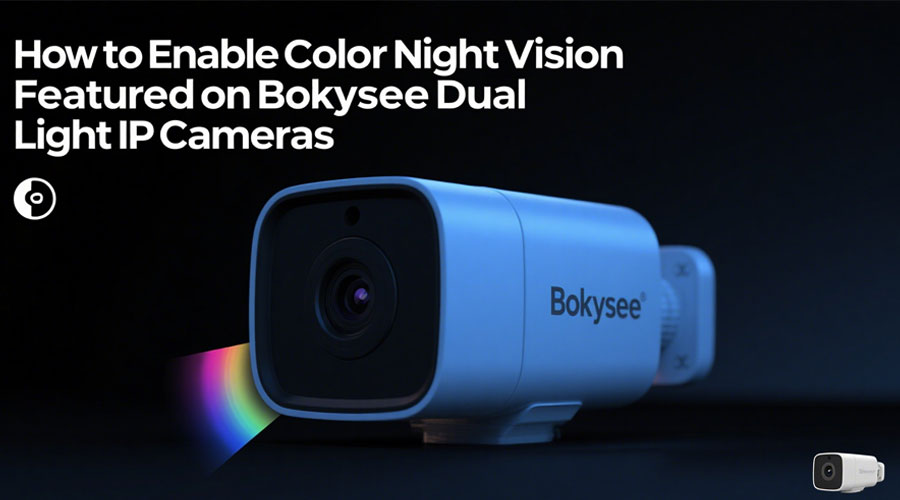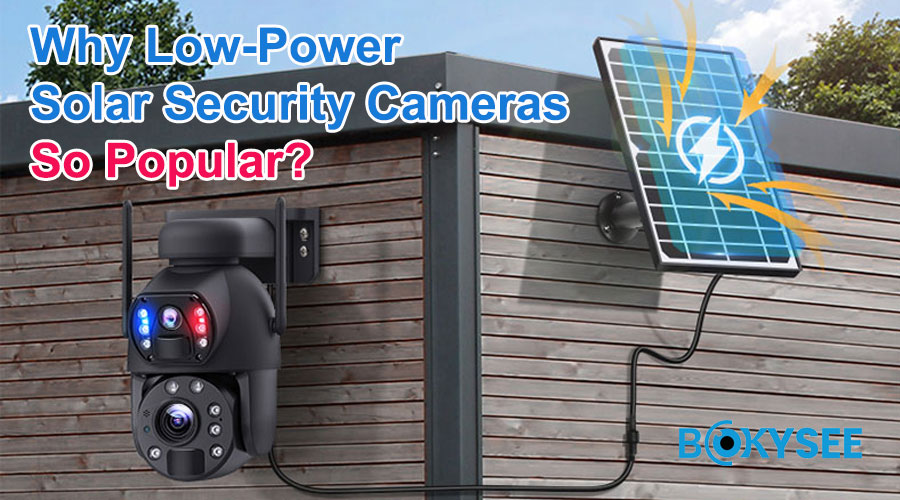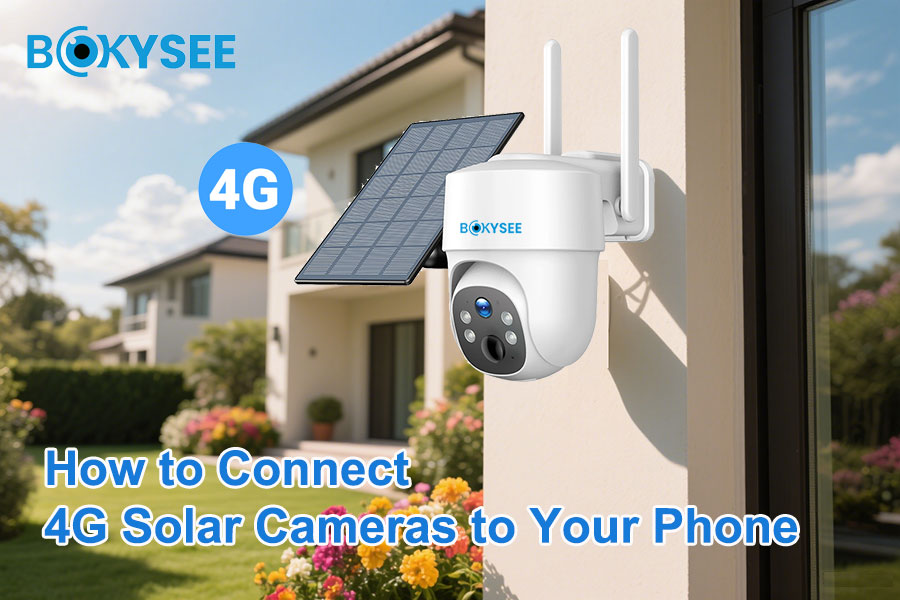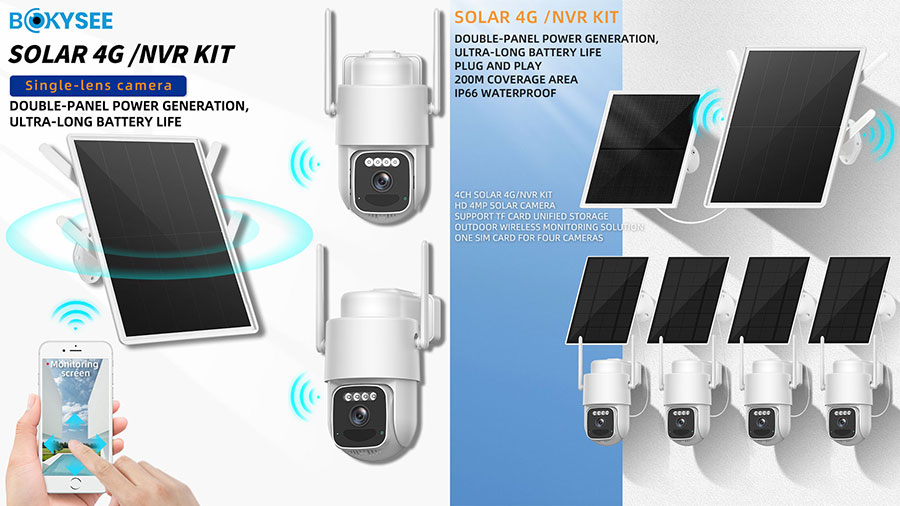Introducción En el mundo moderno, la seguridad se ha convertido en un aspecto esencial de nuestras vidas. Con el avance de la tecnología, las cámaras IP se han convertido en una opción popular para los sistemas de vigilancia. En esta guía completa, exploraremos las diferencias entre las cámaras IP con cable e inalámbricas y le ayudaremos a tomar una decisión informada según sus necesidades de seguridad.
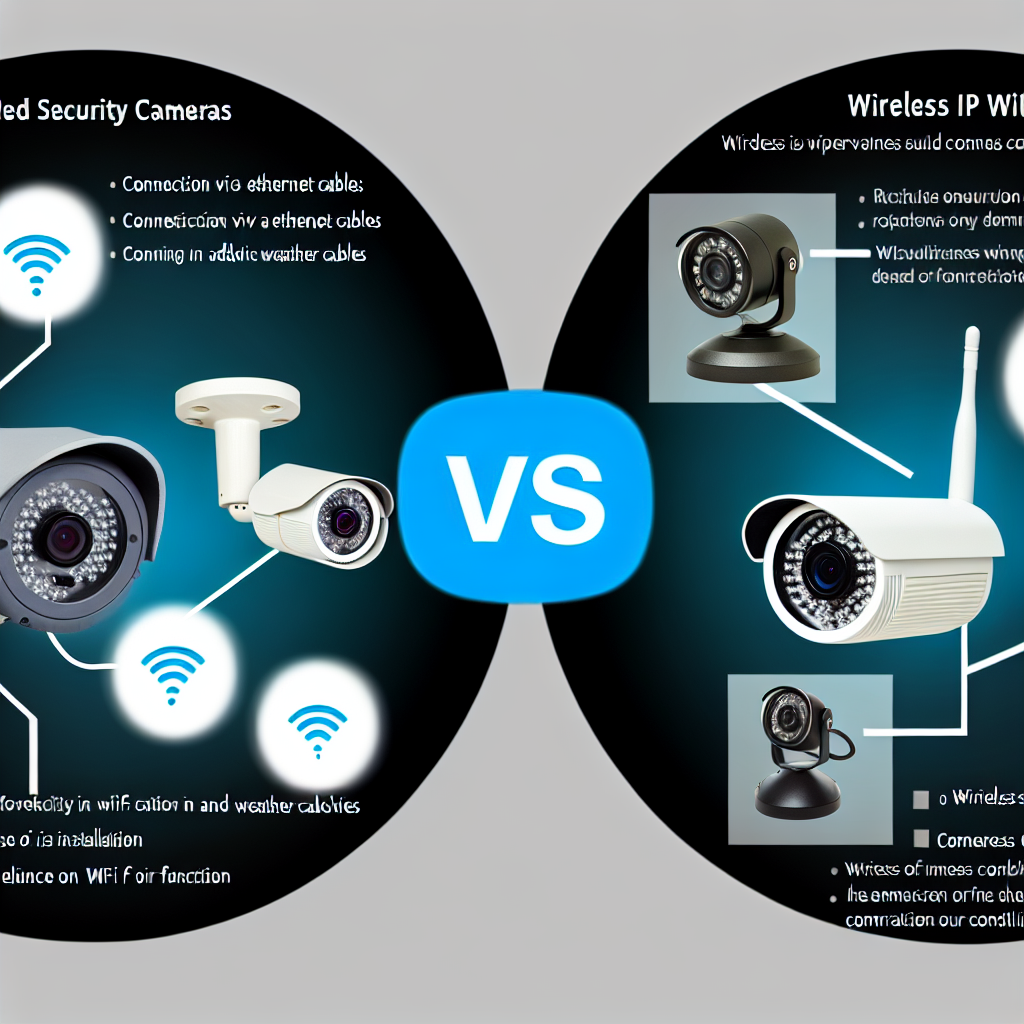
I. Cámaras de seguridad IP con cable:
A. Definición y mecanismo de funcionamiento
Las cámaras de seguridad IP con cable son cámaras de vigilancia que transmiten datos y reciben energía a través de cables físicos. A diferencia de cámaras inalámbricasEstas cámaras se conectan directamente a una red mediante cables Ethernet. Su funcionamiento eficiente depende de la infraestructura cableada.
B. Ventajas de las cámaras de seguridad IP con cable
– Conexión confiable y estable: las cámaras IP con cable ofrecen una conexión estable sin interferencias de otros dispositivos.
– Sin interferencias de otros dispositivos: las cámaras con cable no se ven afectadas por interferencias de otros dispositivos electrónicos, lo que garantiza imágenes de alta calidad uniformes.
– Mayor calidad y resolución de video: las cámaras IP con cable proporcionan imágenes de alta calidad, lo que facilita la identificación de detalles.
C. Desventajas de las cámaras de seguridad IP con cable
– Instalación complicada: las cámaras IP con cable requieren pasar cables por paredes, techos u otras estructuras, lo que a menudo requiere asistencia profesional y lleva tiempo.
– Flexibilidad limitada en la ubicación: las cámaras con cable dependen de rutas de cables, lo que restringe dónde se pueden colocar o reubicar.
Mayores costos de instalación y mantenimiento: Las cámaras IP con cable suelen tener mayores costos iniciales de instalación y de mantenimiento continuo para la sustitución o reparación de cables. A pesar de estas desventajas, las cámaras de seguridad IP con cable siguen siendo una solución de vigilancia fiable y de alta calidad. La elección entre cámaras con cable e inalámbricas depende de los requisitos específicos, el presupuesto y la comodidad deseada en un sistema de vigilancia.
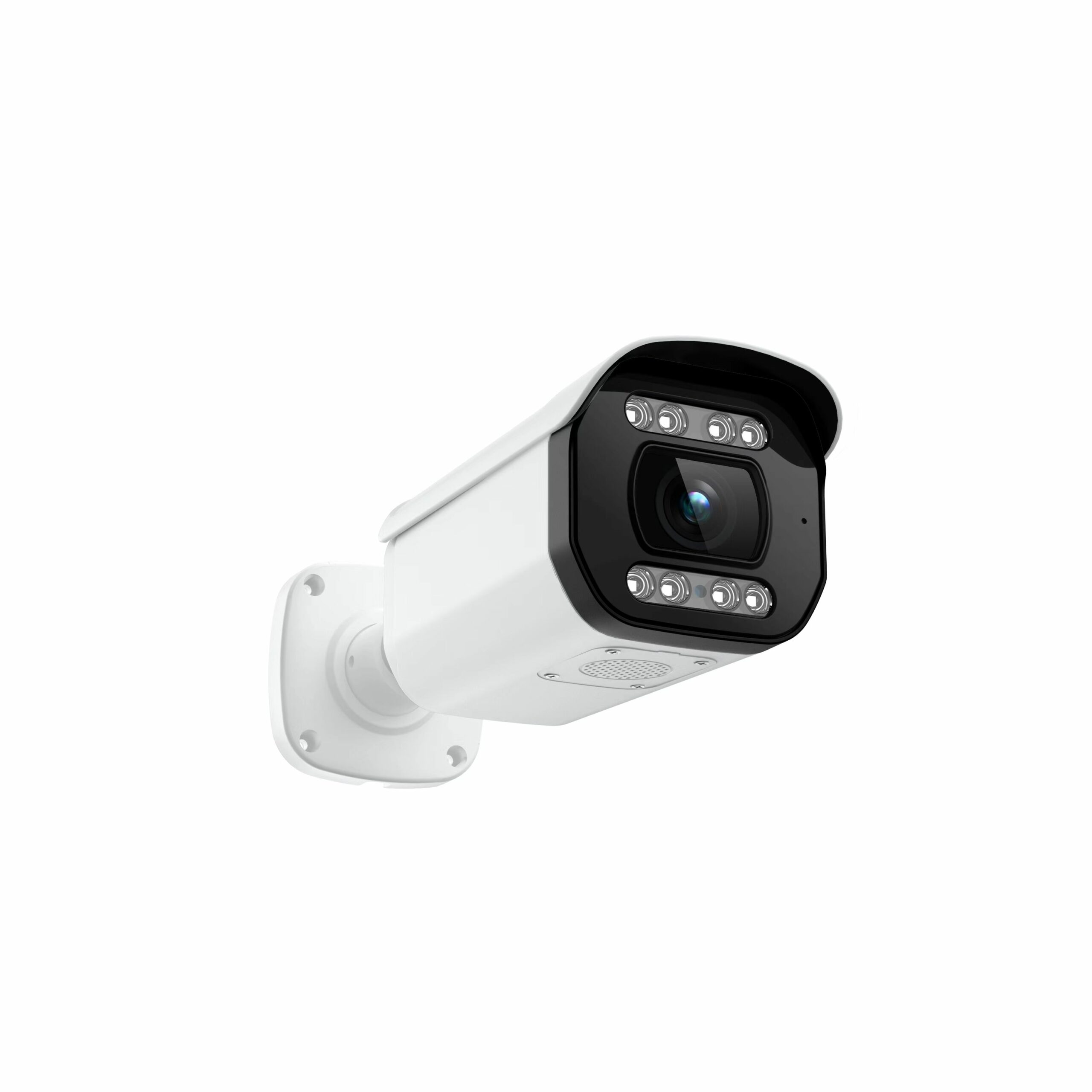
II. Cámaras de seguridad IP inalámbricas:
A. Definición y mecanismo de funcionamiento
Cámaras de seguridad IP inalámbricas Son dispositivos de vigilancia avanzados que transmiten datos y reciben energía de forma inalámbrica. Utilizan Wi-Fi u otras tecnologías inalámbricas para enviar secuencias de video a un enrutador o punto de acceso, lo que permite el acceso remoto. Estas cámaras funcionan con baterías recargables o se pueden conectar a una fuente de alimentación, y algunos modelos incluso utilizan paneles solares para instalaciones en exteriores.
B. Ventajas de las cámaras de seguridad IP inalámbricas
– Fácil instalación: Las cámaras IP inalámbricas se pueden colocar en cualquier lugar dentro del alcance de la red Wi-Fi sin un cableado complejo.
– Ubicación flexible de la cámara: Sin estar restringido por cables, las cámaras inalámbricas se pueden instalar en varias ubicaciones para brindar una mejor cobertura y eliminar los puntos ciegos.
– Menores costos de instalación y mantenimiento: Las cámaras inalámbricas reducen los gastos de instalación al eliminar la necesidad de un cableado extenso. Además, simplifican el mantenimiento, ya que no hay cables que mantener ni reemplazar.
C. Desventajas de las cámaras de seguridad IP inalámbricas
– Interferencia de otros dispositivos: Las cámaras inalámbricas pueden ser propensas a interferencias de dispositivos inalámbricos cercanos, lo que podría degradar la calidad del video o interrumpir las conexiones de red.
– Alcance y fuerza de señal limitados: las señales inalámbricas tienen un alcance restringido y su fuerza puede disminuir cuando están obstruidas por paredes o barreras, lo que puede afectar el rendimiento de la cámara y la calidad del video.
Posibles vulnerabilidades de seguridad: La comunicación inalámbrica presenta el riesgo de acceso no autorizado a la red de la cámara, lo que requiere un cifrado robusto y configuraciones de red seguras para mitigar estos riesgos. A pesar de estas desventajas, las cámaras de seguridad IP inalámbricas ofrecen flexibilidad, fácil instalación y ahorro de costos. Sin embargo, es necesario considerar cuidadosamente los requisitos específicos del sistema de vigilancia y sus posibles inconvenientes antes de tomar una decisión de compra.
3.Cooperación de varios componentes:
Varias partes de la cámara trabajan juntas para una vigilancia fluida. El sensor de imagen, la lente, etc., trabajan en conjunto y transmiten las señales visuales al dispositivo conectado. Para obtener mejores resultados, el sensor de imagen y la lente deben mantenerse limpios.
4. Detección de movimiento:
La detección de movimiento es una función común en diferentes modelos de cámaras solares 4G. Esta función avanzada ayuda a ahorrar energía. La cámara puede iniciar y pausar la grabación al detectar cualquier objeto en movimiento. Si no detecta ningún objeto en movimiento, la cámara ahorra energía automáticamente.
5. Conectividad:
Esta es una de las partes más importantes de una cámara solar 4G. Una antena y un módulo de conectividad 4G garantizan que la cámara se conecte correctamente a la red celular. Podrá acceder a imágenes en directo gracias a la conectividad 3G/4G/LTE.
6. LED IR:
LED IR significa "Diodo Emisor de Luz Infrarroja" y se utiliza para capturar imágenes nocturnas. Es una función avanzada que proporciona visión nocturna. Puede visitar el sitio web de nuestra empresa para adquirir una cámara avanzada equipada con tecnología LED IR.
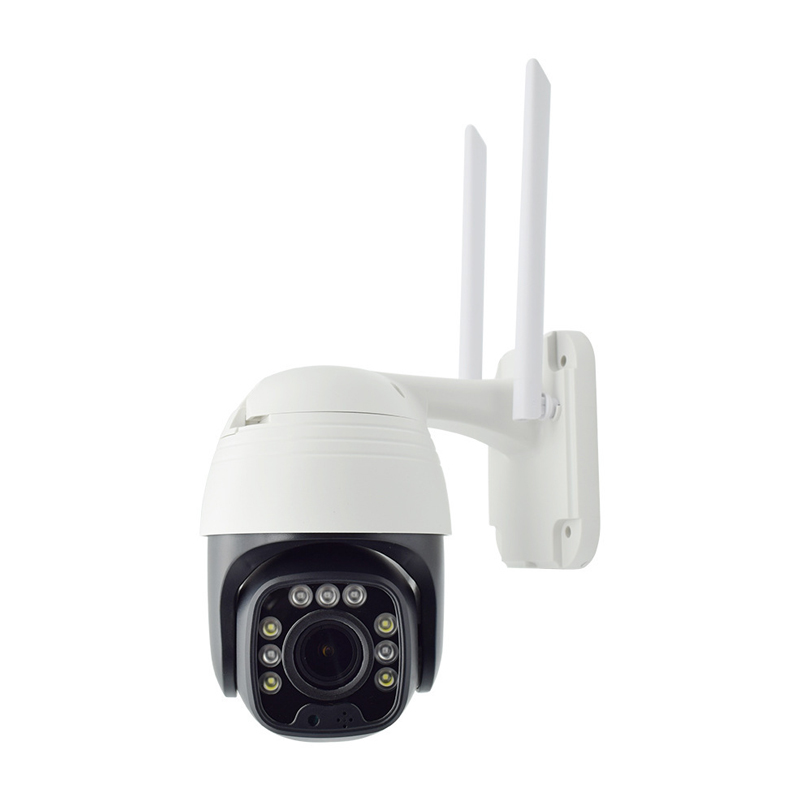
III. ¿Es mejor tener cámaras de seguridad con cable o inalámbricas?
A la hora de elegir las cámaras de seguridad adecuadas para su propiedad, decidir entre opciones con cable o inalámbricas puede ser complicado. Para tomar una decisión informada, hay varios factores que deben considerarse.
A. Factores a considerar
Necesidades y requisitos de seguridad: Evaluar el nivel de seguridad que necesita su propiedad es crucial. Las cámaras con cable suelen proporcionar una conexión más estable y fiable, lo que las hace ideales para entornos de alta seguridad. Por otro lado, las cámaras inalámbricas ofrecen flexibilidad de instalación y se pueden mover o reubicar fácilmente según sea necesario. - Presupuesto: El presupuesto suele ser un factor importante al comprar cámaras de seguridad. Los sistemas con cable suelen ser más caros debido al coste de los cables, los conectores y la instalación profesional. Sin embargo, las cámaras inalámbricas suelen tener un coste inicial más elevado, pero pueden ahorrar dinero a largo plazo al eliminar la necesidad de un cableado extenso. - Distribución de la propiedad y opciones de ubicación de las cámaras: La distribución de su propiedad es fundamental para determinar el tipo de sistema de cámaras que debe elegir. Si su propiedad tiene un terreno difícil o varios edificios, las cámaras inalámbricas pueden ser más convenientes, ya que no requieren conectividad física. Por el contrario, las cámaras con cable son adecuadas para ubicaciones fijas y vigilancia a larga distancia.
B. Comparando los pros y los contras
Una vez que haya considerado los factores mencionados anteriormente, es esencial evaluar las ventajas y desventajas de las cámaras de seguridad con cable e inalámbricas.
Las cámaras con cable ofrecen una conexión más fiable, lo que garantiza una grabación ininterrumpida. No son vulnerables a las interferencias de otros dispositivos, manteniendo una calidad de grabación constante. Sin embargo, su instalación puede ser compleja y lenta, por lo que requiere asistencia profesional. Además, los sistemas con cable tienen limitaciones en cuanto a flexibilidad y opciones de reubicación.
Las cámaras inalámbricas, por otro lado, ofrecen una instalación sencilla y flexibilidad en su ubicación. Requieren un cableado mínimo, lo que reduce los costos y el tiempo de instalación. Sin embargo, las conexiones inalámbricas a veces pueden ser menos confiables, afectadas por interferencias de señal o limitaciones de distancia. También pueden ser necesarios cambios o recargas regulares de la batería, lo que aumenta las necesidades de mantenimiento.
C. Tomar una decisión informada
Para tomar una decisión informada, es fundamental sopesar los factores mencionados anteriormente y elegir la opción que mejor se adapte a sus necesidades. Si prioriza una conexión estable y segura con un mantenimiento mínimo, las cámaras con cable son la mejor opción. Por otro lado, si la flexibilidad, la facilidad de instalación y las opciones de reubicación son más importantes, las cámaras inalámbricas pueden ser la mejor opción.
En última instancia, la decisión entre cableado y Cámaras CCTV inalámbricas Depende de sus necesidades específicas, presupuesto y distribución de la propiedad. Al considerar cuidadosamente estos factores y evaluar las ventajas y desventajas, podrá tomar una decisión segura que satisfaga eficazmente sus necesidades de seguridad.
IV. ¿Cuáles son las desventajas de las cámaras IP inalámbricas?
Las cámaras IP inalámbricas se han vuelto cada vez más populares en el ámbito de la seguridad doméstica gracias a su comodidad y facilidad de instalación. Sin embargo, también presentan desventajas. En esta sección, exploraremos las limitaciones y desventajas de las cámaras IP inalámbricas para ayudarle a tomar una decisión informada.
A. Alcance y potencia de señal limitados
Una de las principales desventajas de las cámaras IP inalámbricas es su alcance y potencia de señal limitados. A diferencia de las cámaras con cable, que se conectan directamente a la red mediante cables Ethernet, las cámaras inalámbricas dependen de las señales Wi-Fi para transmitir datos. Esto significa que la distancia entre la cámara y el router Wi-Fi puede afectar significativamente su rendimiento.
Al explorar esta limitación con más detalle, las cámaras inalámbricas pueden tener dificultades para mantener una conexión fiable cuando se ubican lejos del router o tras obstáculos como paredes o muebles. La intensidad y la estabilidad de la señal Wi-Fi determinarán la calidad del vídeo y el funcionamiento general de la cámara. Por lo tanto, si tiene una propiedad grande o piensa colocar la cámara lejos del router, podría experimentar degradación de la señal y problemas de conectividad con las cámaras IP inalámbricas.
B. Interferencia de otros dispositivos
Otra desventaja de las cámaras IP inalámbricas es la posibilidad de interferencias de otros dispositivos. Las redes Wi-Fi operan en frecuencias específicas, comúnmente 2,4 GHz o 5 GHz. Sin embargo, estas frecuencias se comparten con muchos otros dispositivos, como teléfonos inalámbricos, monitores de bebés, hornos microondas e incluso redes Wi-Fi cercanas. La presencia de estos dispositivos puede causar interferencias en la señal, lo que provoca retardo en el video, mala calidad de imagen o incluso desconexiones totales.
Comprender la posibilidad de interrupciones causadas por dispositivos cercanos es fundamental para determinar la fiabilidad de las cámaras IP inalámbricas. Es importante considerar la cantidad de dispositivos en las inmediaciones y la posibilidad de superposición de frecuencias que podría afectar negativamente el rendimiento de la cámara.
C. Posibles vulnerabilidades de seguridad
Si bien la tecnología inalámbrica ofrece comodidad, también presenta posibles vulnerabilidades de seguridad. Las cámaras IP inalámbricas dependen de conexiones Wi-Fi, lo que las hace vulnerables a intentos de piratería. Los ciberdelincuentes pueden aprovechar las vulnerabilidades de seguridad del firmware de la cámara o usar contraseñas débiles para obtener acceso no autorizado a la señal de la cámara.
Analizar los riesgos asociados con las conexiones inalámbricas y las posibilidades de piratería es crucial al considerar la seguridad de su hogar o propiedad. Es importante asegurarse de que su cámara IP inalámbrica utilice protocolos de cifrado robustos, se actualice periódicamente el firmware y permita la personalización de contraseñas para minimizar el riesgo de acceso no autorizado.
En conclusión, si bien las cámaras IP inalámbricas ofrecen gran flexibilidad y facilidad de instalación, presentan ciertas desventajas. El alcance y la intensidad de la señal limitados, la posible interferencia de otros dispositivos y el riesgo de vulnerabilidades de seguridad son aspectos cruciales a considerar al elegir entre cámaras IP con cable e inalámbricas. Comprender estas limitaciones le ayudará a tomar una decisión informada que se ajuste a sus necesidades de seguridad específicas.
V. ¿Qué es mejor: cámaras de seguridad PoE o inalámbricas?
A. Comprensión de las cámaras PoE (Alimentación a través de Ethernet)
La tecnología PoE ha revolucionado la forma en que se alimentan y conectan las cámaras de seguridad. En un Sistema de cámara PoETanto la alimentación como la transmisión de datos se realizan a través de un único cable Ethernet, lo que elimina la necesidad de cables de alimentación independientes. Esto no solo simplifica la instalación, sino que también reduce los costes asociados al cableado adicional.
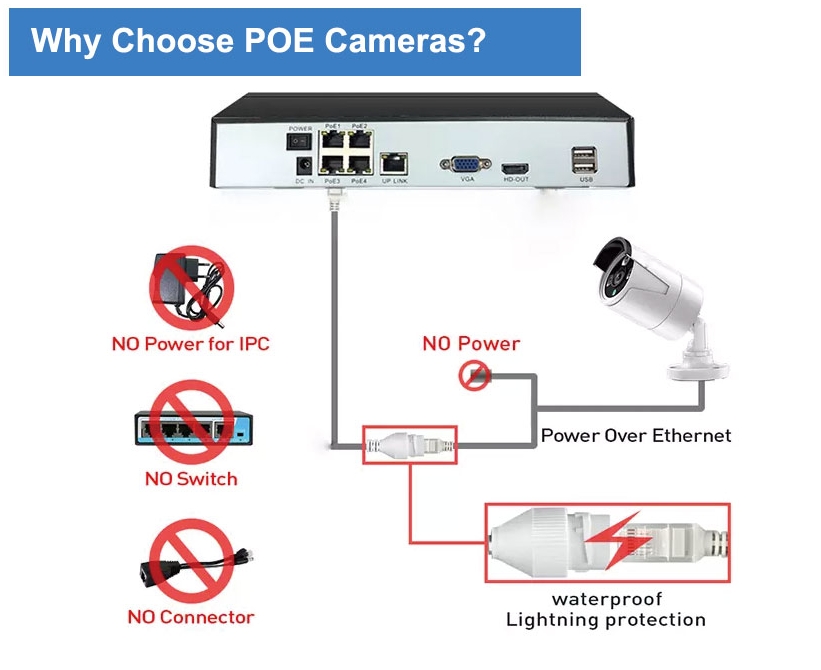
Los beneficios de Cámaras PoE Vaya más allá de la comodidad y la rentabilidad. Con PoE, puede garantizar un suministro de energía constante a sus cámaras, incluso durante cortes de energía, ya que pueden conectarse a un conmutador de red PoE con batería de respaldo. Además, las cámaras PoE ofrecen mayor resistencia a la manipulación, ya que no dependen de tomas de corriente de fácil acceso.
B. Comparación de cámaras PoE e inalámbricas
Al comparar cámaras PoE e inalámbricas, es crucial comprender sus ventajas y desventajas. Las cámaras PoE ofrecen una conexión más fiable y estable que las inalámbricas, ya que no son susceptibles a interferencias de otros dispositivos ni a obstrucciones físicas como paredes. Esto las convierte en la opción ideal para propiedades grandes o zonas propensas a congestiones de red.
Por otro lado, las cámaras inalámbricas ofrecen mayor flexibilidad en cuanto a su ubicación. No requieren conexiones físicas, lo que facilita su reubicación sin necesidad de cableado adicional. Su instalación suele ser más sencilla y requiere menos experiencia técnica, lo que las hace ideales para propiedades pequeñas o necesidades de monitoreo temporal.
C. Elegir la opción ideal
La elección entre cámaras PoE e inalámbricas debe basarse en sus necesidades específicas de seguridad. Si prioriza una conexión estable e ininterrumpida, Cámaras PoE Son la mejor opción. Son ideales para áreas grandes, propiedades comerciales o ubicaciones con instalaciones complejas. Sin embargo, si prioriza la flexibilidad y la facilidad de instalación, las cámaras inalámbricas pueden ser más adecuadas. Son convenientes para propiedades más pequeñas, unidades de alquiler o zonas donde es frecuente reubicar las cámaras.
Tenga en cuenta su presupuesto, la infraestructura disponible y el nivel de seguridad requerido. También es importante evaluar las ventajas de cada tipo de cámara y determinar cuál se adapta mejor a sus necesidades específicas.
En conclusión, la elección entre cámaras de seguridad PoE e inalámbricas depende, en última instancia, de sus circunstancias y preferencias particulares. Ambas opciones tienen sus propias ventajas, y es fundamental sopesar sus ventajas y desventajas en función de sus necesidades de seguridad específicas para tomar una decisión informada.
Conclusión:
En este blog, exploramos las ventajas y desventajas de las cámaras de seguridad IP con cable e inalámbricas. Las cámaras con cable ofrecen una conexión más fiable y estable, lo que las hace adecuadas para zonas de alta seguridad. Eliminan el riesgo de interferencias y piratería informática, lo que proporciona tranquilidad. Por otro lado, las cámaras inalámbricas ofrecen flexibilidad y una fácil instalación. Se pueden colocar en cualquier lugar dentro del alcance de la red Wi-Fi y permiten una cómoda monitorización remota. La elección entre cámaras con cable e inalámbricas depende de las necesidades individuales, considerando factores como la ubicación, el propósito y el presupuesto. En definitiva, invertir en... Cámaras de seguridad IP Mejora la seguridad y la protección, por lo que es importante evaluar cuidadosamente los requisitos específicos antes de tomar una decisión.
En resumen:
Somos Fabricantes de cámaras de seguridad Desarrollamos con entusiasmo productos de la mejor calidad y precio. Si busca una cámara IP con cable e inalámbrica para máxima seguridad y con las últimas funciones, contáctenos. Además cámaras de seguridad al por mayorTambién trabajamos con una amplia variedad de productos, incluyendo cámaras AHD, cámaras PTZ, cámaras Wi-Fi, cámaras solares y kits de CCTV. Con años de experiencia como fabricantes de equipos originales (OEM) y fabricantes de diseños originales (ODM) de marcas reconocidas, nos comprometemos a desarrollar productos de vigilancia más seguros y de última generación. Visite nuestro sitio web para obtener más información.

